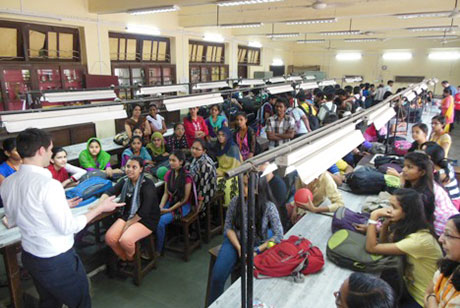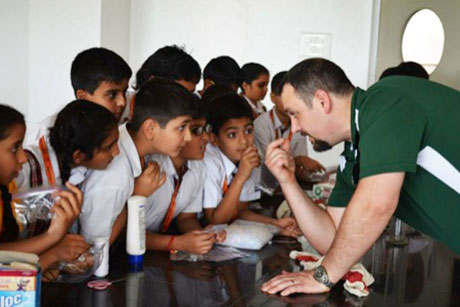Students, teachers unite in India for science literacy
By Josephine Engreitz


Earlier this year, four Cornell graduate students and two local high school physics teachers traveled to India to exchange best practices in science education with Indian schoolteachers.
The trip was part of the Cornell GK-12 Grass Roots program, an educational initiative funded by the National Science Foundation that aims to advance science literacy and sustainable energy research. GK-12 partners Cornell graduate students with K-12 teachers in a mutual learning exchange program; teachers gain access to hands-on science and engineering research alongside the graduate students, who in turn gain experience teaching science to K-12 students.
For the January India trip, the group worked with Somaiya Vidyavihar, a private education organization in India that serves more than 27,000 students ranging from primary to graduate school in Mumbai and underserved rural parts of India. Samir Somaiya ’90, M.S. ’92, MBA ’93, is the organization’s president.
Cornell’s GK-12 program historically has worked with local teachers from rural schools in and around Tompkins County. The India exchange demonstrated the program’s recent effort to include an international component.
“Our GK-12 Grass Roots program has afforded our graduate students an invaluable opportunity to engage with teachers and their communities and to develop science communication and leadership skills, all while dedicating themselves to research that solves some of the world’s most pressing problems,” said Paulette Clancy, the Samuel W. and Diane M. Bodman Professor of Chemical and Biomolecular Engineering, who leads the program with Emmanuel Giannelis, the Walter R. Read Professor of Engineering in the Department of Materials Science and Engineering. “I am proud that we have funded roughly 25 Ph.D. students and engaged 18 K-12 local teachers to be involved in advancing energy research.”
In addition to experiencing science education in Indian schools, program participants had the opportunity to visit a sugar biorefinery in rural India to explore how biomass can be transformed into saleable chemical products. GK-12 Grass Roots program manager Julie Nucci, adjunct professor of materials science and engineering, said: “All parts of the sugar cane plant are processed and used. In the name of sustainability, they get all that they can from this crop.”
Angela Stelson, a graduate student in materials science and engineering, was among the four students who traveled to India.
“As an engineer, it’s important to understand the global implications of your work and to contribute in a meaningful way,” she said. “This trip allowed me to learn about teaching science from experienced educators in both India and the United States, and to apply that knowledge when working with Indian students.”
In accordance with GK-12’s mutual learning model, the exchange involved two K-12 teachers from India conducting STEM (science, technology, engineering, math) research with students at Cornell last summer.
Graduate student Corinne Kingsley was paired with Vaishali Salunke from Somaiya Vidyavihar Shri Sharda English Medium School in India. Kingsley and Salunke studied fiber imaging using magnetic resonance force microscopy techniques.
“Vaishali’s enthusiasm to learn and participate spoke volumes for her dedication and passion for education,” Kingsley said. “She was soaking in everything she could to take back to India with her.”
GK-12 fellow Rohit Singh worked with Indian teacher Beena Vazhapilly to research algae flocculation, a chemical process used to separate algae from water so it can be used to make biodiesel. “For me it was a terrific experience that allowed me to improve my leadership and communication skills,” Singh said.
Although Cornell’s GK-12 funding ends after this summer, Nucci and Clancy hope to continue the program in the future. Materials science and engineering chair Darrell Schlom, the Herbert Fisk Johnson Professor of Industrial Chemistry, endorsed the continuation of the international component, emphasizing, “It isn’t sightseeing.”
Rather, according to Nucci and Clancy, the program is grounded in service learning and the implementation of engineering design solutions, “not to mention the incomparable cultural riches for anyone fortunate enough to participate.”
Josephine Engreitz is a writer intern for the Cornell Chronicle.
Media Contact
Get Cornell news delivered right to your inbox.
Subscribe